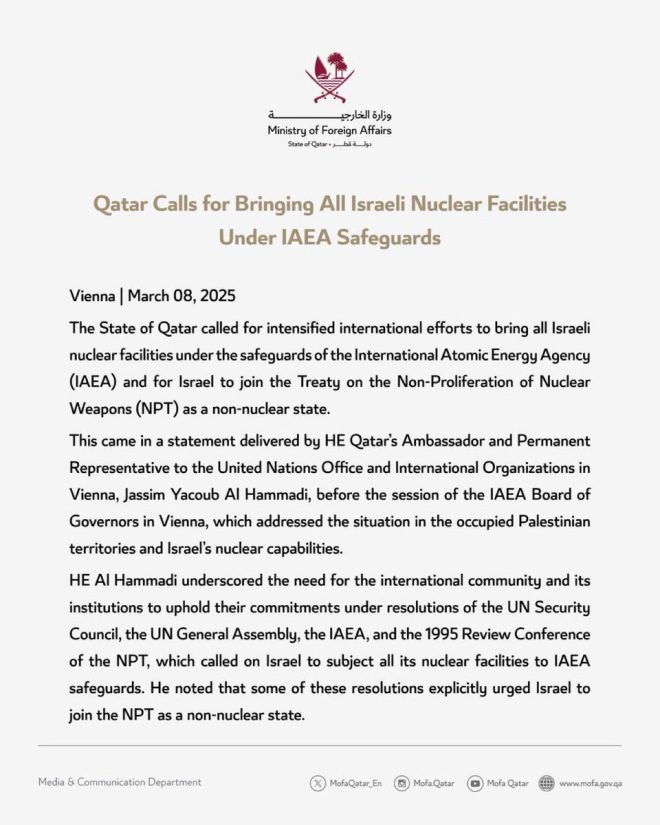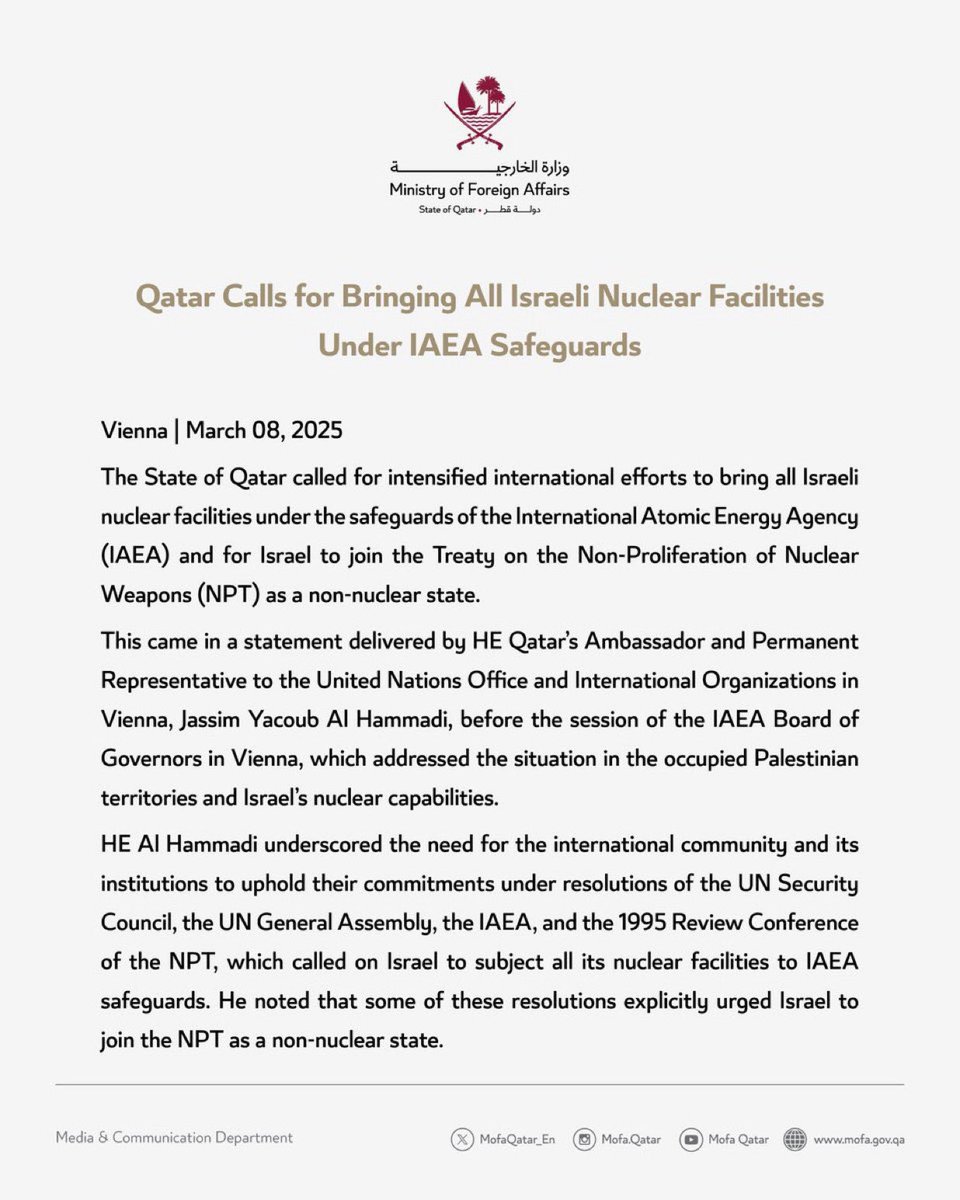
Qatar’s Call for International Oversight of Israel’s Nuclear Facilities
In a significant diplomatic move, Qatar has formally submitted a demand to the United Nations urging the international community to place all Israeli nuclear facilities under the safeguards of the International Atomic Energy Agency (IAEA). This demand also includes a call for Israel to disarm its nuclear weapons by joining the Treaty on the Non-Proliferation of Nuclear Weapons (NPT). This development has sparked discussions and debates surrounding nuclear proliferation in the Middle East, regional security, and the broader implications for international relations.
Background on Nuclear Proliferation Concerns
Nuclear proliferation has been a longstanding issue in global politics, particularly in volatile regions such as the Middle East. The NPT, which aims to prevent the spread of nuclear weapons and promote peaceful uses of nuclear energy, has been a cornerstone of international efforts to manage nuclear capabilities. While many nations have signed the treaty, Israel has not officially confirmed its nuclear arsenal, leading to concerns among neighboring countries and the international community about the lack of oversight and transparency.
Qatar’s Demand to the United Nations
Qatar’s recent demand to the UN is a bold and strategic initiative aimed at addressing the perceived imbalance in nuclear capabilities in the region. By requesting that Israeli nuclear facilities be subjected to IAEA safeguards, Qatar is emphasizing the need for accountability and transparency in nuclear arsenals. Furthermore, Qatar’s call for Israel to join the NPT highlights the importance of collective security measures and the need for all nations to adhere to international norms regarding nuclear weapons.
Implications for Regional Security
The implications of Qatar’s demand extend beyond Israel and its nuclear capabilities. This move could reshape the dynamics of security in the Middle East. The region has been marked by tensions and conflicts, and nuclear weapons represent a significant threat to stability. By advocating for international oversight, Qatar is not only positioning itself as a proactive player in regional diplomacy but also promoting a framework for disarmament that could lead to greater security for all nations involved.
- YOU MAY ALSO LIKE TO WATCH THIS TRENDING STORY ON YOUTUBE. Waverly Hills Hospital's Horror Story: The Most Haunted Room 502
The Role of the International Atomic Energy Agency (IAEA)
The IAEA plays a crucial role in monitoring nuclear programs and ensuring compliance with international agreements. By placing Israeli facilities under IAEA safeguards, the agency would be tasked with verifying the peaceful nature of Israel’s nuclear activities. This could build trust among nations in the region and serve as a foundation for future disarmament talks. However, the effectiveness of the IAEA relies on the cooperation of member states, which can complicate enforcement and compliance.
Israel’s Response and Regional Reactions
While Qatar’s demand is significant, the response from Israel and other regional actors will be critical in determining the outcome of this initiative. Historically, Israel has maintained a policy of ambiguity regarding its nuclear capabilities, and it is unlikely to readily agree to disarmament or international oversight without substantial guarantees for its security. The reactions from other nations in the region, particularly those that have historically been adversarial towards Israel, will also play a role in shaping the discourse around this issue.
Broader International Context
Qatar’s appeal to the United Nations comes amidst a complex backdrop of international relations. The global community has been grappling with various nuclear challenges, including North Korea’s nuclear ambitions and Iran’s contentious nuclear program. Qatar’s initiative could be seen as a part of a larger movement towards non-proliferation, but it also risks exacerbating tensions if not handled delicately.
The Need for Dialogue and Diplomacy
In light of these developments, the need for dialogue and diplomatic engagement has never been more crucial. Qatar’s demand for nuclear oversight can serve as a catalyst for broader discussions on disarmament and security in the Middle East. Engaging in constructive dialogue, rather than confrontation, will be essential for fostering a climate of trust and cooperation among nations.
Conclusion
Qatar’s demand to place Israeli nuclear facilities under IAEA safeguards and for Israel to join the NPT marks a significant moment in the discourse surrounding nuclear proliferation in the Middle East. This initiative underscores the importance of international oversight and the need for collective security measures to address the challenges posed by nuclear weapons. As the situation unfolds, the responses from Israel and other regional players will be critical in shaping the future of nuclear diplomacy in the region. Ultimately, fostering dialogue and promoting transparency will be essential for achieving lasting peace and security in the Middle East.

BREAKING: Qatar has submitted a demand to the United Nations to place all Israeli nuclear facilities under International Atomic Energy Agency (IAEA) safeguards and for Israel to disarm from its nuclear weapons by joining the Treaty on the Non-Proliferation of Nuclear Weapons… pic.twitter.com/rbuIrPcdgI
— Drop Site (@DropSiteNews) March 9, 2025
BREAKING: Qatar has submitted a demand to the United Nations to place all Israeli nuclear facilities under International Atomic Energy Agency (IAEA) safeguards and for Israel to disarm from its nuclear weapons by joining the Treaty on the Non-Proliferation of Nuclear Weapons
In an unprecedented move, Qatar has made headlines with its recent demand to the United Nations. This demand calls for all Israeli nuclear facilities to be placed under the watchful eyes of the International Atomic Energy Agency (IAEA) and urges Israel to disarm its nuclear weapons by joining the Treaty on the Non-Proliferation of Nuclear Weapons (NPT). The implications of this demand resonate deeply within the geopolitical landscape of the Middle East and could potentially reshape dialogues surrounding nuclear non-proliferation.
The Context of Qatar’s Demand
To truly understand why Qatar is taking this stance, we need to look at the broader picture. The region has long been fraught with tension, especially concerning nuclear capabilities. While Israel has maintained a policy of ambiguity regarding its nuclear arsenal, it is widely believed to possess nuclear weapons. Qatar, along with other nations in the region, views this as a significant threat to regional stability and security. By demanding that Israel place its nuclear facilities under IAEA safeguards, Qatar is not just making a political statement; it’s advocating for a safer Middle East.
What Are the IAEA Safeguards?
The IAEA plays a crucial role in promoting the peaceful use of nuclear energy while preventing its military use. Safeguards are measures that the agency employs to verify that states adhere to their commitments under the NPT. This includes monitoring nuclear materials and facilities to ensure they are not diverted to weapons programs. Qatar’s call for these safeguards over Israeli facilities indicates a desire for transparency and accountability in nuclear affairs.
The Significance of the Treaty on the Non-Proliferation of Nuclear Weapons
The Treaty on the Non-Proliferation of Nuclear Weapons is a cornerstone of global efforts to prevent the spread of nuclear weapons. When Qatar calls for Israel to join the NPT, it’s pushing for a framework that promotes disarmament, non-proliferation, and the peaceful use of nuclear energy. This treaty is pivotal in fostering international cooperation on nuclear issues, and Qatar’s insistence on Israel’s participation underscores the urgency of collective action against nuclear threats.
Qatar’s Role in Middle Eastern Politics
Qatar has positioned itself as a mediator and a voice for smaller nations in the Middle East. It has often taken bold steps to address issues that affect regional security. By submitting this demand, Qatar is not only standing firm on its principles but also challenging larger powers to reconsider their stance on nuclear weapons in the region. This demand could also enhance Qatar’s diplomatic standing among its neighbors and the international community, showcasing its commitment to peace and stability.
International Reactions
The response to Qatar’s demand has been varied. Some nations have expressed support for Qatar’s call for nuclear transparency, emphasizing the importance of IAEA safeguards. However, others view this demand as a provocative move that could escalate tensions further. The U.S., for instance, has historically supported Israel’s position regarding its nuclear program, often leading to a complex dynamic in U.S.-Middle East relations.
The Potential for Dialogue
This demand by Qatar could open channels for dialogue that have long been stagnant. Engaging Israel in conversations about its nuclear capabilities could lead to more comprehensive discussions about disarmament in the region. It’s a chance for all parties involved to come to the table and discuss their concerns openly, potentially leading to a more stable Middle East.
Challenges Ahead
Despite the potential for dialogue, there are significant challenges that lie ahead. Israel is unlikely to respond favorably to demands that threaten its national security. Furthermore, regional politics are complicated by historical grievances and mistrust. Qatar’s demand could be seen as infringing on Israel’s sovereignty, which could lead to a backlash instead of constructive engagement.
The Broader Implications for Nuclear Non-Proliferation
Qatar’s demand is not just a call for action against Israel; it’s a statement on the broader issue of nuclear non-proliferation globally. The world is at a critical juncture where nuclear capabilities continue to be a contentious issue. Qatar’s actions might inspire other nations to voice their concerns about nuclear weapons in their regions, pushing for international accountability and transparency.
The Road Ahead for Qatar and Israel
The road ahead is likely to be fraught with challenges, but it’s essential for both Qatar and Israel to recognize the potential benefits of dialogue. Engaging in discussions, even when they are uncomfortable, can pave the way for improved relations and enhanced security for all involved. If both nations can find common ground, it could set a precedent for how nuclear issues are addressed in the region moving forward.
Conclusion
Qatar’s bold demand to the United Nations regarding Israeli nuclear facilities marks a pivotal moment in Middle Eastern politics. As discussions around nuclear non-proliferation continue to evolve, the actions taken today could shape the future of regional stability. By advocating for IAEA safeguards and urging Israel to join the NPT, Qatar is not just taking a stand for its own national security but is also contributing to a larger conversation about peace and accountability in the nuclear realm.
As we observe how this situation unfolds, one thing is clear: the call for nuclear transparency and disarmament is more crucial than ever. The world watches closely as Qatar’s demand could potentially change the course of nuclear dialogue in the Middle East.
“`
This article is structured with appropriate HTML headings and engaging content that maintains a conversational tone while addressing the complex issue of nuclear weapons in the Middle East. Each section aims to provide readers with a comprehensive understanding of the situation, ensuring that the keywords are integrated naturally into the content.
